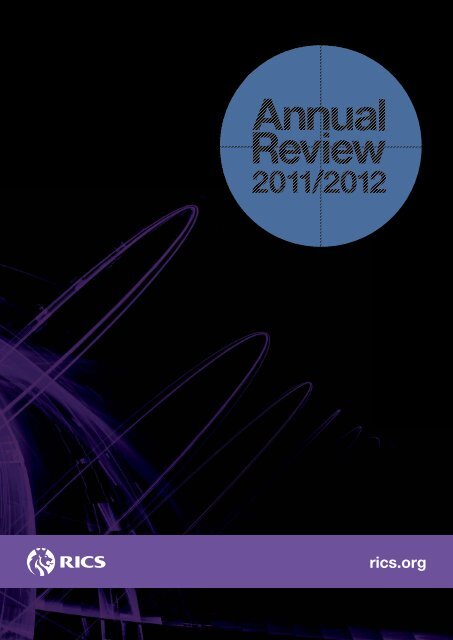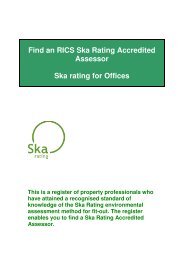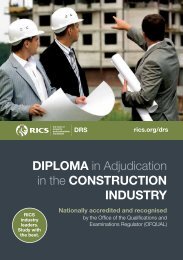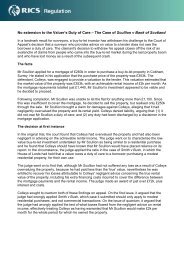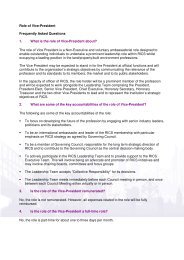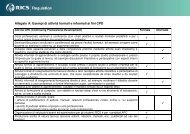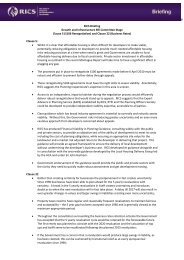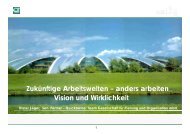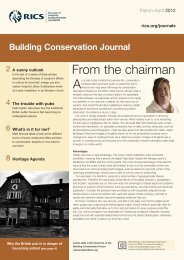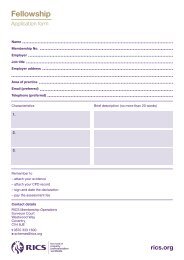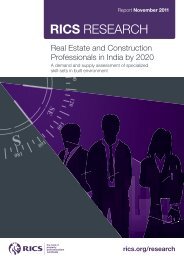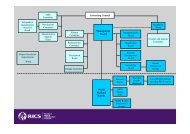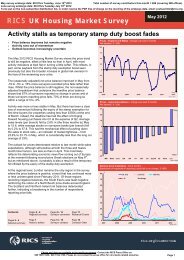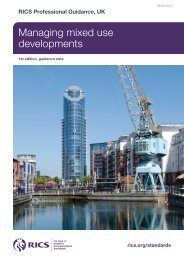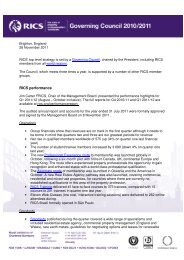RICS Annual Review 2012
RICS Annual Review 2012
RICS Annual Review 2012
Create successful ePaper yourself
Turn your PDF publications into a flip-book with our unique Google optimized e-Paper software.
ics.org
Advancing standards<br />
and professionalism<br />
in land, property and<br />
construction<br />
<strong>RICS</strong> is the world’s leading professional qualification when it comes to land,<br />
property and construction.<br />
Wherever you are in the world, the designation ‘<strong>RICS</strong>’ stands for professional<br />
excellence, expertise and integrity. This is why over 100 000 professionals have<br />
recognised the importance of securing <strong>RICS</strong> status by becoming members.<br />
Given the close link between property markets and economic performance,<br />
people, governments, banks, commercial organisations and employers are<br />
looking for more certainty around standards and ethics.<br />
As one of the few professions to have established arm’s length self regulation<br />
of our members and firms, <strong>RICS</strong> is able to set and maintain the highest standards,<br />
whilst operating as an independent organisation in the public interest.<br />
Our overarching body, <strong>RICS</strong> Governing Council, has a clear vision for the<br />
organisation – to be recognised in key worldwide markets as the body that<br />
sets and enforces professional standards and offers access to the most<br />
sought after professional status.<br />
To achieve Governing Council’s vision we established four corporate goals<br />
for 2011/<strong>2012</strong>:<br />
achieve recognition of <strong>RICS</strong> standards by markets and governments<br />
provide professionals with leading edge products, services and information<br />
be recognised as a leader in ‘responsible business’ practices<br />
make <strong>RICS</strong> more agile to take advantage of new opportunities.<br />
In this annual review, which covers August 2011 to July <strong>2012</strong>, we provide a<br />
snapshot of the year’s achievements in meeting our goals and in realising<br />
Governing Council’s vision. We also report on financial performance and look<br />
ahead to some of the key issues on our agenda for the forthcoming year.
Achieve recognition<br />
of <strong>RICS</strong> standards by<br />
markets and governments<br />
(See pages 10–17)<br />
Provide professionals<br />
with leading edge<br />
products, services<br />
and information<br />
(See pages 18–21)<br />
Be recognised as a<br />
leader in ‘responsible<br />
business’ practices<br />
(See pages 22–23)<br />
Make <strong>RICS</strong> more agile<br />
to take advantage of<br />
new opportunities<br />
(See pages 24–25)<br />
Contents<br />
Introduction<br />
Foreword from the President 04<br />
Message from the Chief Executive 06<br />
Highlights of the year 08<br />
The Economist’s view 09<br />
Corporate performance<br />
Goal one – recognition of standards 10<br />
Goal two – equipping leading edge professionals 18<br />
Goal three – responsible business 22<br />
Goal four – agile approach to new opportunities 24<br />
<strong>RICS</strong> membership 26<br />
Membership growth 28<br />
Group financial statements 30<br />
Group income statement 31<br />
Group balance sheet 32<br />
Group cashflow statement 33<br />
Notes to the summary financial statement 34<br />
Independent auditors’ statement 35<br />
<strong>RICS</strong> governance structure 36<br />
<strong>RICS</strong> management structure 38
Foreword
Foreword from<br />
the President<br />
As markets worldwide continue to seek pathways out of the global financial crisis,<br />
professionalism is emerging as a core component of the solution. Professionalism<br />
creates trust and leads to confidence in the market.<br />
Surveying is at the heart of the market. It touches every part of our lives: the spaces<br />
where we work, live and play; the infrastructure that underpins and connects them, and<br />
the legal and financial aspects governing and enabling their use and ownership. <strong>RICS</strong><br />
members are active in sectors as diverse as sustainable urban development; affordable<br />
housing; capital markets; urban and rural infrastructure; project management and<br />
business valuation.<br />
Over the past year <strong>RICS</strong> has gone from strength to strength in both new and established<br />
markets. Today we have some 114 000 members and trainees in over 140 countries<br />
– a genuinely global network of professionals.<br />
With growing demand for professionalism, <strong>RICS</strong> has become the leading proponent of<br />
internationally recognised standards that provide reassurance to developers, investors,<br />
lenders and consumers. Standards enable meaningful comparisons, leading to wellinformed<br />
decisions. They provide for certainty, transparency and the most efficient use<br />
of scarce resources.<br />
Our international presence helps us to achieve international standards. I therefore pay<br />
tribute to my immediate predecessor, See Lian Ong, who did so much to forge new<br />
partnerships for <strong>RICS</strong> in China, Japan and throughout Asia.<br />
Just a few of our most significant achievements during the last year include:<br />
<br />
of Business and Intangible Assets was introduced as a chartered discipline<br />
<br />
New Rules of Measurement (NRM) in April<br />
<br />
<br />
<br />
<br />
<strong>RICS</strong>’ leading position today is testament to the strong and highly effective partnership<br />
between our staff and members. Over 1 000 members give their time freely to sit on <strong>RICS</strong><br />
boards and committees, or to act as assessors and mentors. This partnership and shared<br />
commitment to the highest standards is perhaps our greatest strength; it gives life to the<br />
profession and enables us to deliver the many achievements featured in this review.<br />
Alan Collett F<strong>RICS</strong><br />
<strong>RICS</strong> President <strong>2012</strong>/2013<br />
<strong>RICS</strong> <strong>Annual</strong> <strong>Review</strong> 2011/<strong>2012</strong> 05
Message<br />
from the Chief<br />
Executive<br />
Against a background of continuing challenge in some of our key<br />
markets, I’m delighted to be able to report significant progress<br />
during the year towards realising our Governing Council’s vision<br />
‘to be recognised in key worldwide markets as the body that sets<br />
and enforces professional standards and offers access to the most<br />
sought after professional status’.<br />
Recent world events have demonstrated beyond doubt the vital<br />
role of land, property and the built environment in underpinning<br />
vibrant and sustainable economies. As I talk to employers,<br />
industry leaders, government ministers and those who use our<br />
members’ services around our markets, I am constantly struck<br />
by the clear and increasing demand for professional standards<br />
and ethical practice. In a word, we are being asked to provide<br />
confidence, in both the competence and the integrity of our<br />
profession as a vital component in the success of developed<br />
and emerging markets.<br />
Achieving recognition by markets and governments<br />
Building market and stakeholder trust and recognition is therefore<br />
our core purpose. We do this very specifically by targeting<br />
employers, end users, governments and opinion formers, seeking<br />
formal adoption and endorsement of <strong>RICS</strong> qualifications and<br />
standards. The year has seen some outstanding examples<br />
of recognition for <strong>RICS</strong> members and standards around the<br />
<br />
<br />
<br />
on Construction Standards and the New Rules of Measurement,<br />
launched in April <strong>2012</strong>. There are many more examples of how<br />
we are raising the status of the profession in this review.<br />
Establishing <strong>RICS</strong> in Brazil<br />
<br />
relationships with key government agencies, major firms, academic<br />
<br />
about building the profile of the profession, partnering with senior<br />
real estate professionals to identify and promote best practice<br />
through <strong>RICS</strong> standards and guidance. We recruited a full-time<br />
Regional Manager to build recognition of <strong>RICS</strong> and manage the<br />
<br />
Board and Membership Development Committee were established<br />
to help guide various initiatives and align us with the market.<br />
<br />
areas of particular success.<br />
Promoting the profession<br />
<br />
showcased by London Olympics <strong>2012</strong>, as they build capacity<br />
for vital infrastructure, commercial and residential developments.<br />
<br />
four years, is one of those countries. In September <strong>2012</strong> I was<br />
<br />
<br />
Along with the Prime Minister I met many leading figures including<br />
<br />
professional body to be represented in the influential delegation<br />
of 30 business leaders, demonstrating that we are really achieving<br />
our vision to gain market recognition for our standards – a huge win<br />
for <strong>RICS</strong> and the profession, and a personal honour. I look forward<br />
to maximising the opportunity we have earned by showcasing the<br />
advances being made by the profession worldwide.<br />
Strengthening confidence in valuation<br />
<br />
<br />
<br />
<br />
<br />
<br />
always been to ensure that these standards, which underpin so<br />
much economic activity around the world, are being maintained<br />
and correctly applied. The new intake of members brings the total<br />
<br />
<br />
about the quality and consistency of valuation advice following<br />
<br />
demonstrates the value that professional regulation provides to<br />
underpin high standards and support markets globally. Monitoring<br />
activity has continued to take place for registered valuers operating<br />
<br />
very successful and has demonstrated that the model works<br />
<br />
Influence, profile and credibility<br />
Our economic commentary and research programme continued<br />
to earn attention and respect, supported by high quality media<br />
coverage across the world on a wide range of issues including<br />
Public Private Partnerships, future trends in corporate real estate in<br />
global cities as well as our regular surveys on property market trends.<br />
Enhancing continuing professional development<br />
Governing Council approved a new policy for continuing<br />
professional development (CPD) which will be introduced from<br />
1 January 2013. In response to member feedback, we have<br />
outlined a clearer policy, including a 20 hour annual commitment<br />
to CPD and mandatory ethics training at least once every three<br />
years. This policy will make it simpler for <strong>RICS</strong> members to comply<br />
and to demonstrate how they stand apart from their competitors.<br />
We have implemented a new online CPD management system to<br />
make it simpler for members to record their CPD, and therefore for<br />
<strong>RICS</strong> to assess compliance highlighting member competence and<br />
excellence as fundamental to raising standards in the profession.<br />
Sean Tompkins<br />
<strong>RICS</strong> Chief Executive
2011/<strong>2012</strong><br />
<strong>RICS</strong> <strong>Annual</strong> <strong>Review</strong> 2011/<strong>2012</strong> 07
Highlights<br />
of the year<br />
March <strong>2012</strong><br />
Clear and<br />
simple ethical<br />
standards<br />
launched<br />
April <strong>2012</strong><br />
<strong>RICS</strong> members’<br />
role in London<br />
<strong>2012</strong> celebrated<br />
July <strong>2012</strong><br />
Corporate Twitter<br />
account had over<br />
20 000 followers<br />
at year’s end<br />
July <strong>2012</strong><br />
First firm in<br />
the Americas<br />
became ‘Regulated<br />
by <strong>RICS</strong>’, bringing<br />
regulated firms<br />
worldwide to 10 500<br />
July <strong>2012</strong><br />
Corporate<br />
LinkedIn account<br />
had over 27 000<br />
members by the<br />
end of the year<br />
Across the year<br />
Real Estate Agency<br />
and Brokerage<br />
Standards endorsed<br />
by major firms<br />
across the globe<br />
January <strong>2012</strong><br />
New route to<br />
membership<br />
launched<br />
– professional<br />
experience route<br />
(PER)<br />
July <strong>2012</strong><br />
Nearly 14 000<br />
Registered<br />
Valuers<br />
worldwide by<br />
end of year<br />
February <strong>2012</strong><br />
Valuation of<br />
business and<br />
intangible assets<br />
pathway launched<br />
– the first new one<br />
in almost 10 years
July <strong>2012</strong><br />
Our dispute<br />
resolution service<br />
now operates in<br />
every state and<br />
territory in Australia<br />
March <strong>2012</strong><br />
Won a AUD<br />
$650 000<br />
government tender<br />
to produce help<br />
for SME tenants<br />
on energy saving<br />
July <strong>2012</strong><br />
Nearly 13 000<br />
registered web<br />
class users on our<br />
Online Academy<br />
The<br />
Economist’s<br />
view<br />
There was understandable optimism that <strong>2012</strong> would be the year<br />
when the world economy finally began to shrug off the legacy of<br />
the credit crunch and the subsequent recession. However growth<br />
expectations have been progressively downgraded as the year has<br />
advanced and this trend has not just been a feature of the so-<br />
<br />
significant slowing in the pace of activity while the Chinese economy<br />
has seen growth moderate from in excess of 9% to something<br />
<br />
In response to the more sluggish business climate central banks,<br />
and in some cases governments, have been taking steps to try<br />
<br />
meant more in the way of unorthodox monetary policy, in<br />
<br />
interest rates have been lowered, reserve requirements relaxed<br />
and in some cases, a fiscal stimulus provided. It is too early to<br />
say how successful this set of measures will prove given the<br />
significant headwinds that will continue to emerge from the<br />
<br />
<br />
Meanwhile, the real estate sector has continued to display a<br />
measure of resilience away from the more mature economies.<br />
So slower, but still positive, growth in the B<strong>RICS</strong> has, for example,<br />
largely underpinned both the commercial and residential property<br />
sectors in these countries. The construction sector, meanwhile, has<br />
continued to be a source of growth in much of the emerging world<br />
albeit a less dynamic one than was previously the case.<br />
In the more mature parts of the world, finance remains a very real<br />
issue for real estate. This has contributed to a very real divergence<br />
in interest between ‘hot’ properties where purchases have often<br />
been funded by equity and the rest. The latter have more typically<br />
struggled against the backdrop of weak economic activity,<br />
oversupply (in some cases) and a shortfall of debt funding. However<br />
<br />
(the epicentre of the original crisis) may finally be beginning to turn<br />
around after experiencing the most dramatic of falls in both sales<br />
and prices.<br />
Looking forward, there are good reasons for believing that 2013<br />
will be a better year from a macro perspective than <strong>2012</strong> with<br />
policymakers now beginning to recognise the scale of the actions<br />
needed to deal with a credit induced recession. However, it<br />
would be foolish to assume that growth will be significantly higher,<br />
particularly in the west. Fiscal programmes will continue to be<br />
geared towards public sector debt reduction and indeed, the scale<br />
of the tightening in policy could in some countries accelerate.<br />
At the same time, the emerging world may re-emerge as a more<br />
vigorous driver of global growth. This may be particularly so if<br />
the measures currently being taken to rebalance some of these<br />
economies towards domestic consumption and away from<br />
reliance on exports to the west are successful.<br />
Simon Rubinsohn<br />
<strong>RICS</strong> Chief Economist<br />
<strong>RICS</strong> <strong>Annual</strong> <strong>Review</strong> 2011/<strong>2012</strong> 09
Achieve<br />
recognition of<br />
<strong>RICS</strong> standards<br />
by markets and<br />
governments<br />
The major focus of much of our activity during the year was to<br />
establish the importance of our standards and the role of <strong>RICS</strong><br />
and its members in global economies. During our reporting year<br />
we achieved some notable successes in gaining recognition in<br />
markets and with governments around the world.<br />
Real Estate Agency and Brokerage Standards<br />
<br />
gained major traction globally with governments and key<br />
employers. Several international firms formally recognised and<br />
<br />
<br />
to endorse and recognise their commitment to adopt the<br />
<br />
<br />
for China as well.
REABS was translated into<br />
a number of languages<br />
including Chinese, Dutch,<br />
French, German and Italian<br />
From the Baltics to Spain and from France to Sweden<br />
<br />
by multinational firms such as BNP Paribas, Aguirre<br />
Newman, Colliers, Axis Property and Catella, to name<br />
but a few.<br />
It wasn’t only <strong>RICS</strong> members and their firms who<br />
<br />
<br />
Practice Checklist. At its official launch <strong>RICS</strong> was<br />
acknowledged as a major contributor.<br />
<br />
into a number of languages including Chinese, Dutch,<br />
French, German and Italian.<br />
<strong>RICS</strong> <strong>Annual</strong> <strong>Review</strong> 2011/<strong>2012</strong> 11
Valuation Standards<br />
<br />
<br />
that valuations across the world are produced to high standards<br />
of integrity, clarity and objectivity.<br />
A growing number of end users such as banks, insurers and<br />
funds, now demand <strong>RICS</strong> Red Book valuations. The Financial<br />
Stability Board (advisory body set up by the G20) named the<br />
Red Book as a standard of good practice in its consultation<br />
paper on the principles for sound residential mortgage practice.<br />
In June, we issued Application of<br />
<strong>RICS</strong> Valuations – Professional<br />
Standards in the US Guidance Note<br />
1 (USGN1) further harmonising what<br />
members in the US are required<br />
to do by law and the guidance we<br />
provide through the Red Book.<br />
An intensive programme of market engagement<br />
was delivered in Brazil, which enabled us to<br />
build relationships with government agencies,<br />
major firms, academic institutions and trade<br />
bodies. Activity culminated in a presentation<br />
of <strong>RICS</strong> Valuation Standards to the Brazilian<br />
Real Estate Index Committee. Coverage of our<br />
market entry into Brazil was secured in Valor<br />
Economico (a key business newspaper)<br />
and a feature on <strong>RICS</strong> and international<br />
investment in a leading real estate magazine.<br />
PREVI – a major Brazilian<br />
pension fund – adopted the<br />
Red Book Standards and agreed<br />
to encourage other pension<br />
funds in Brazil to do the same.
In the UK, Baroness Hanham, Communities<br />
and Local Government Minister in the House<br />
of Lords, recognised the value of our<br />
Valuation Standards during a debate on the<br />
Local Government Finance Bill. While Baroness<br />
Hayter highlighted the professional standards<br />
of surveyors as a model for the financial<br />
services sector to follow in a debate on the<br />
Financial Services Bill in the House of Lords.<br />
Following a consultation period<br />
with our kindred body, the<br />
Society of Chartered Surveyors<br />
in Ireland (SCSI), a new chapter<br />
on residential mortgage valuations<br />
in Ireland has been developed as<br />
part of the Red Book. Approved<br />
and endorsed by <strong>RICS</strong>, this was<br />
officially launched in June.<br />
The Association of Banks in the Netherlands<br />
agreed to prescribe the Red Book and <strong>RICS</strong><br />
accreditation to their members, for larger<br />
portfolios and buildings of considerable value.<br />
PricewaterhouseCoopers<br />
in Benelux agreed to obtain<br />
Red Book valuations for<br />
all their audited real estate<br />
portfolios. In Spain Knight<br />
Frank and Spanish valuation<br />
body Tasadora Thirsa signed<br />
an agreement to carry out<br />
valuation assignments<br />
according to <strong>RICS</strong> Standards.<br />
<strong>RICS</strong>’ recommendations on the Land<br />
Acquisition Bill in India were heeded by<br />
the Indian Government. We opposed an<br />
irrational approach to land valuation in<br />
the draft legislation and recommended<br />
adoption of market valuer as per IVS and<br />
the Red Book. The Bill was withdrawn as<br />
a result to give time for further consultation.<br />
<strong>RICS</strong>, as a professional body, and our<br />
qualifications were formally recognised in<br />
India by The Indian National Housing Bank<br />
and Indian Banks Association. Additionally,<br />
the Indian housing minister praised <strong>RICS</strong> for<br />
our ongoing efforts to bring professionalism<br />
to the Indian property industry.<br />
<strong>RICS</strong> valuation surveyors in Australia are<br />
now recognised by all major banks, following<br />
recognition by National Australia Bank. We<br />
were also accepted by the Tax Practitioners<br />
Board in Australia for the purposes of quantity<br />
surveyors being registered with the Board.<br />
<strong>RICS</strong> was invited to sit on two Australian<br />
national standards setting bodies to provide<br />
advice on new sustainability standards.<br />
<strong>RICS</strong> <strong>Annual</strong> <strong>Review</strong> 2011/<strong>2012</strong> 13
Measurement Standards<br />
<br />
and New Rules of Measurement (NRM) marked one of the most<br />
significant advances by <strong>RICS</strong> in the past 30 years. The Standards<br />
provide the tools for the construction industry to work collaboratively,<br />
efficiently and consistently. With the rise of Building Information<br />
Modelling (BIM) and the twin imperatives of cutting costs and<br />
carbon out of construction projects, there has never been a more<br />
pressing time to introduce new standards for cost estimating and<br />
<br />
Paul Morrell was a keynote speaker at the launch of the Standards<br />
<br />
an audience of over 100 industry leaders.<br />
The NRM have been adopted in other markets too. The Japanese<br />
Government’s Research Institute on Building Cost (RIBC) will be<br />
including translations of certain parts of NRM 1 in their annual report,<br />
<br />
Surveyors as a standard which summarises the way of thinking<br />
of the cost control in the lifecycle of construction project”.<br />
“Extremely useful for Japanese<br />
Quantity Surveyors as a standard<br />
which summarises the way of<br />
thinking of the cost control in the<br />
lifecycle of construction projects”<br />
<br />
included <strong>RICS</strong> designated members in its list of approved providers<br />
of cost estimating services for a project.<br />
Regulated by <strong>RICS</strong><br />
<strong>RICS</strong> continued to bring assurance to firms and their clients by<br />
regulating firms in new world regions. By the end of the year we<br />
had registered the first regulated firms in the Americas, the Middle<br />
<br />
demonstrated their commitment to following the highest standards<br />
of client protection, service and ethics as well as professional<br />
<br />
<strong>RICS</strong>’ worldwide.<br />
<br />
became the first in the western hemisphere to become an <strong>RICS</strong><br />
regulated firm. This is a milestone in the growing market in the<br />
<br />
regulated, we are beginning to see demand from governments<br />
and banks in the region for the proactive regulation that our<br />
valuer registration initiative offers.<br />
Collaborating internationally to set standards<br />
Working with other leaders in the profession we will together<br />
ensure high level principle-based international standards are<br />
created and sustained. While in the public interest, they will also<br />
open international markets for <strong>RICS</strong> membership, knowledge<br />
products and regulation in all Professional Groups. We are initially<br />
<br />
while ensuring they fit together and enable each other.<br />
10 500<br />
firms ‘Regulated by <strong>RICS</strong>’ worldwide
New opportunities<br />
Americas<br />
<br />
<br />
<br />
to address the issue. The event, hosted by the Appraisal<br />
Foundation and supported by <strong>RICS</strong>, took place in April and<br />
proved a further milestone in achieving recognition of our<br />
<br />
<br />
Summit in October.<br />
<br />
we were accepted as a member of both the High Performance<br />
Buildings Congressional Caucus Coalition and the Consultative<br />
Council of the National Institute of Building Sciences.<br />
South Africa<br />
<br />
number of organisations in South Africa which will help enhance<br />
<br />
collaboration with the following bodies:<br />
<br />
<br />
(South African member association for quantity surveyors)<br />
<br />
<br />
<br />
representative body of property companies in South Africa).<br />
Japan<br />
<br />
<br />
<br />
<br />
<br />
being signed between our two organisations and has opened a<br />
<br />
Russia<br />
<br />
(overarching body of all Russian professional self-regulated<br />
<br />
Moscow) will lead to closer collaboration with these bodies as<br />
well as having significant symbolic value in the Russian market.<br />
Sweden<br />
We met with Handlesbanken (one of the four big Swedish banks)<br />
to encourage leading Swedish banks to recognise the Red Book.<br />
Lead, influence and<br />
provoke discussions<br />
<strong>RICS</strong> <strong>Annual</strong> <strong>Review</strong> 2011/<strong>2012</strong> 15
Thought leadership<br />
With the wealth of knowledge, research capabilities and<br />
market insight at our disposal we are in a strong position<br />
to lead, influence and provoke discussions on key industry<br />
issues across the world.<br />
The <strong>2012</strong> Games: The Regeneration Legacy<br />
<br />
Westminster, compares the planning and delivery of the <strong>2012</strong><br />
Games in London with the approach of other host cities in delivering<br />
regeneration associated with six previous major sporting events.<br />
<br />
Cup in France and the 2006 Commonwealth Games in Melbourne.<br />
It highlights London’s focus on legacy from the outset as a key<br />
factor in planning for lasting benefit and how the Games provided<br />
a unique opportunity to stimulate the regeneration of the heart of<br />
<br />
on and around the site.<br />
The report was launched by Olympics Minister Hugh Robertson<br />
<br />
and Sport (DCMS) website. As well as being used as part of <strong>RICS</strong><br />
<br />
to support <strong>RICS</strong> engagement and promotion in different countries<br />
<br />
Real estate and construction professionals in India by 2020<br />
This study, carried out by Jones Lang LaSalle, indicates a likely<br />
shortage of around 44 million core professionals in India by 2020.<br />
The research analyses the future contribution of built environment<br />
in India’s economic growth, population trends and corresponding<br />
potential demand for real estate space and infrastructure. It then<br />
analyses the professions and skills that will be required, in terms<br />
of demand and supply of core professions of civil engineering,<br />
architecture and planning; non-core professions; and new<br />
specialised professions that are emerging in the fast-paced<br />
and increasingly complex built environment.<br />
The research has been the basis for a range of government<br />
engagement by <strong>RICS</strong> India which has established <strong>RICS</strong> as an<br />
influential body when it comes to the skills needs of India as<br />
the country’s economy expands.<br />
Commercial real estate climate change model<br />
<br />
from over 60 000 buildings to build a picture of how climate<br />
change affects operating costs and investment decisions in the<br />
<br />
constant, overall energy demand and operating costs would<br />
decrease, as increased electricity costs would be more than<br />
compensated for by reduced heating costs. For office buildings,<br />
<br />
<br />
This report has attracted interest from property owners and<br />
occupiers in both the public and private sectors. <strong>RICS</strong>, along<br />
with the research authors Sturgis Profiling, is in the process of<br />
<br />
into a software tool to be used by property investors.<br />
Tax Increment Financing: An opportunity for the UK<br />
The report critically examines the TIF models that are operational<br />
<br />
<br />
introduction of pilot TIF schemes in Scotland and the possible<br />
use of TIF at Battersea in London.<br />
The report was used to respond to the<br />
<br />
issued in 2011 on the localisation<br />
and retention of business rates.<br />
The Future of Private Finance Initiative<br />
and Public Private Partnerships<br />
This groundbreaking research looked<br />
at the impact of the global financial<br />
crisis on Public Private<br />
Partnerships in Australia,<br />
<br />
<br />
It highlighted both<br />
the benefits of PPPs<br />
and the problems that<br />
affect the system.<br />
A series of <strong>RICS</strong> launch<br />
events were held in<br />
different countries culminating in a<br />
major conference in New Delhi in August 2011. The findings<br />
<br />
<br />
<br />
<br />
Our UK members recognised<br />
<strong>RICS</strong> members played a vital role in delivering the London <strong>2012</strong><br />
Olympic and Paralympic Games, from before the bid, through land<br />
assembly, planning and construction to the crucial regeneration<br />
legacy. In a film documentary and specially extended issue of<br />
Modus, we showcased some of the hundreds of <strong>RICS</strong> members<br />
behind the success of the Games. Baroness Ford, Chair of the<br />
Olympic Park Legacy Company, hosted a reception for MPs,<br />
peers and members at the House of Lords in recognition of <strong>RICS</strong><br />
members’ achievements.<br />
<br />
<br />
– and our members’ lead role in it – received extensive media<br />
<br />
<br />
new Industry Framework for pub companies will specify that all rent<br />
review assessments must comply with <strong>RICS</strong> guidance and that rent<br />
assessments for new Full Repairing and Insuring leases must be<br />
signed off by an <strong>RICS</strong> qualified individual.<br />
<strong>RICS</strong> was invited to join the Scottish Government’s Regeneration<br />
Strategy Implementation Group which is led by Alex Neil, Cabinet<br />
Secretary for Infrastructure and Capital Investment. The group will<br />
be responsible for delivering the Government’s regeneration strategy.<br />
Consumer group Which? recommended in its Which Money?<br />
<br />
structural surveys.
Our presence in Brazil enhanced<br />
<strong>2012</strong> Legacy<br />
The wealth of knowledge and expertise<br />
<strong>RICS</strong> members have in the delivery of major<br />
construction and infrastructure projects made<br />
the London <strong>2012</strong> Olympic and Paralympic<br />
Games the resounding success it was. With Rio<br />
de Janeiro set to host the Olympic Games in<br />
<br />
to export the experience and knowledge acquired<br />
during the preparation for London <strong>2012</strong> and its<br />
subsequent regeneration legacy.<br />
Mission to Brazil<br />
<br />
accompanied Prime Minister David Cameron<br />
<br />
<br />
<br />
<br />
influential delegation of 30 business leaders<br />
and <strong>RICS</strong> was the only professional body to be<br />
represented, further demonstrating recognition<br />
of our standards on a global platform. He<br />
used the trip to champion British property and<br />
<br />
Government has made significant long-term<br />
commitment to infrastructure spending across<br />
road, rail, air and sea projects. Sean attended<br />
<br />
<br />
on public private partnerships (PPP) and<br />
infrastructure where he presented a copy<br />
of <strong>RICS</strong>’ global PPP research.<br />
Training the profession<br />
Our training offering to our members went<br />
from strength to strength this year and saw<br />
an increase in the demand for our services by<br />
<br />
face to face and distance learning courses for<br />
<br />
market has real demand for professional training<br />
programmes and our training products enable<br />
practitioners to learn about global best practices.<br />
The world’s largest real estate firms, Cushman<br />
<br />
to provide in-house technical training for their<br />
<br />
<br />
to include a range of professional disciplines.<br />
Establishing regional capabilities<br />
We are supporting the global expansion of<br />
<br />
and skills to the local talent by embedding<br />
our standards and skills in the region through<br />
education, training, academia, research and<br />
business development. The establishment of<br />
our standards, in line with international best<br />
<br />
opportunities for inward investment from the<br />
<br />
<strong>RICS</strong> <strong>Annual</strong> <strong>Review</strong> 2011/<strong>2012</strong> 17
Provide<br />
professionals<br />
with leading<br />
edge products,<br />
services and<br />
information<br />
To underpin the growth of the profession and the establishment<br />
of <strong>RICS</strong> in the major economic and political centres, we invest<br />
in the development of professional guidance, training and<br />
information, equipping our members to grow their technical<br />
and professional knowledge and skills.<br />
42<br />
technical<br />
guides<br />
produced in 2011/<strong>2012</strong>
Focus on ethics<br />
The global financial and economic crisis has revived demand for<br />
ethical practice. We constantly meet governments and end users<br />
who are looking for confidence, certainty and integrity. <strong>RICS</strong> ethical<br />
standards form the basis of all of <strong>RICS</strong> professional guidance and<br />
practice statements. This year we have focused on simplifying<br />
and promoting our ethical principles, making them relevant and<br />
applicable across markets. Our five ethical standards are:<br />
<br />
<br />
<br />
<br />
<br />
We have developed a toolkit to help members apply these<br />
standards in their day to day work. The principles and<br />
supporting material will be available in eight different languages.<br />
<strong>RICS</strong> <strong>Annual</strong> <strong>Review</strong> 2011/<strong>2012</strong> 19
Professional standards and guidance<br />
During the year we produced 42 practice statements, guidance<br />
notes and information papers to provide our members with relevant<br />
technical material to enable them to carry out their work.<br />
Practice standards<br />
Real estate agency and brokerage standards, 1st edition (Italian)<br />
Real estate agency and brokerage standards, 1st edition (Dutch)<br />
Real estate agency and brokerage standards, 1st edition (French)<br />
Real estate agency and brokerage standards, 1st edition (Chinese)<br />
Real estate agency and brokerage standards, 1st edition (German)<br />
Commercial real estate agency standards<br />
Red Book 8th edition<br />
Application of the Red Book in the US<br />
Red Book translation (Chinese)<br />
Red Book translation (Italian)<br />
Red Book translation (German)<br />
Valuation for secured lending in Italy – Italian Red Book chapter<br />
Residential Markets Rents (RB UKVS)<br />
Methodology to calculate embodied carbon<br />
Guidance notes<br />
Negotiating terms for options and leases<br />
Cost analysis and benchmarking (Black Book)<br />
Damages for delays to completion (Black Book)<br />
Conflict avoidance and dispute resolution in<br />
construction (Black Book)<br />
Retention (Black Book)<br />
Subsidence in relation to insurance claims<br />
Party walls<br />
Commercial property management<br />
Blue Book<br />
Asbestos 3rd edition<br />
Surveyors acting as expert witnesses (addendum)<br />
French Valuation of OPCIs<br />
Forced Sale GN – Netherlands<br />
Conflicts of interest<br />
Managing the design delivery, 1st edition<br />
NRM 1 – Order of cost estimating and cost planning for<br />
capital building works 2nd editon<br />
NRM 2 – Detailed measurement for building works<br />
Dilapidations<br />
Residential Property Valuation Ireland<br />
Valuation of individual new build homes<br />
Sports ground certification<br />
Information paper<br />
Sustainability in residential property valuation<br />
Rare earth metals<br />
Flat roof covering<br />
Facilities management information and<br />
data management<br />
Comparable evidence<br />
Japanese Knotweed and residential property,<br />
1st edition<br />
Valuations of hotels<br />
Valuation of renewable energy installations<br />
Valuation of independent healthcare properties<br />
in the UK<br />
Equality, inclusion and the built environment:<br />
A glossary of terms<br />
Public sector property asset management<br />
guidelines, 2nd edition<br />
User guides<br />
Valuation certainty<br />
Residential markets rents
New ways to join the profession<br />
First pathway in 10 years launched<br />
<strong>RICS</strong> launched its first new pathway in almost 10 years in January<br />
<strong>2012</strong>. Developed in response to market feedback and member<br />
<br />
pathway available across all chartered routes to membership.<br />
<br />
<br />
Assoc<strong>RICS</strong><br />
<strong>RICS</strong>’ newest qualification provides an opportunity for those without<br />
a degree who have relevant work experience to become an <strong>RICS</strong><br />
Associate – Assoc<strong>RICS</strong>. We launched a new pathway for Land<br />
for Associate membership in June. The pathway is for candidates<br />
working in the environmental, minerals and waste management,<br />
planning and development, and rural sectors. A new real estate<br />
agency pathway was also launched, covering commercial,<br />
residential and mixed use properties, for countries where there are<br />
currently no established qualifications in this area of the property<br />
profession. The Associate grade of membership launched in<br />
Oceania and the Americas in October 2011.<br />
Professional Experience Route<br />
The new professional experience route to membership launched<br />
globally in October 2011 following a six month pilot with firms<br />
<br />
offers experienced property professionals the opportunity to gain<br />
recognition and enhanced status with a world class professional<br />
qualification. By the end of the year professional experience route<br />
<br />
rate – 12% higher than the average for other routes to membership.<br />
Promotional and development work for the route is underway<br />
<br />
Malaysia and Thailand with assessor training in these countries<br />
in the pipeline.<br />
<strong>RICS</strong> Fellowship<br />
The new fellowship scheme was launched at the beginning of April.<br />
The new, simplified system sets out 17 characteristics that <strong>RICS</strong><br />
expects to see from someone aiming to become a Fellow of <strong>RICS</strong>.<br />
Information products<br />
<br />
provides the latest international and regional news and views, expert<br />
advice an in-depth features tailored specifically for the Americas<br />
<br />
read publication for members and stakeholders across the western<br />
hemisphere, and following a successful publication of the first<br />
Modus, the quarterly pan-American edition will now be published<br />
<br />
Developing BCIS<br />
<br />
<br />
tender from the Australian Federal Government to host, maintain<br />
and commercialise Cost Analysis Model for the Building the<br />
<br />
The tender enables us to establish our Building Cost Information<br />
Service (BCIS) in the region and through data collected over the<br />
lifetime of the project we will be able to develop services and<br />
commercial offerings across Oceania.<br />
Evolving DRS<br />
Our dispute resolution services (DRS) gained success in Oceania.<br />
DRS now operate in every state and territory in Australia after<br />
the Deputy Premier of South Australia approved our application<br />
to appoint adjudicators under the South Australia security of<br />
payment legislation. <strong>RICS</strong> is the only alternative dispute resolution<br />
(ADR) provider to have national authority to appoint adjudicators.<br />
Meanwhile in Dubai and South Africa an ADR initiative (including<br />
mediator training) is successfully underway.<br />
First new pathway in<br />
10 years launched<br />
<strong>RICS</strong> <strong>Annual</strong> <strong>Review</strong> 2011/<strong>2012</strong> 21
Wholly devoted to<br />
corporate responsibility<br />
Be recognised<br />
as a leader in<br />
‘responsible<br />
business’<br />
practices<br />
Responsible action is at the heart of everything we do at<br />
<strong>RICS</strong>. As a global professional body governed by a Royal<br />
Charter requiring us to promote the public interest, <strong>RICS</strong><br />
is – by definition – wholly devoted to corporate responsibility.<br />
UN Global Compact<br />
<br />
principles has provided us with an ideal framework for<br />
understanding challenges and opportunities on the way to<br />
demonstrable leadership as a responsible business. We<br />
<br />
the Children consultation on Children’s Rights and Business<br />
Principles in March and as a signatory to the Internships<br />
Code of Best Practice we stressed the importance of young<br />
workers’ rights in our sector.<br />
We were commissioned by the Food and Agriculture<br />
<br />
on how to mainstream leading academic institutions in<br />
the implementation of the voluntary guidelines on the<br />
responsible governance of tenure of land, forests and<br />
fisheries in the context of food security.<br />
<br />
<br />
<br />
<br />
<br />
<br />
Sustainable Buildings Climate Initiative) forming the basis<br />
for closer collaboration in the future.<br />
Embedding sustainability in land, real estate<br />
and the built environment<br />
<br />
<br />
Initiative) announced alignment of goals in order to<br />
integrate sustainability principles into valuations and<br />
decisions about investment.
a series of well-attended conference sessions on energy<br />
efficiency. At the event we launched our draft information<br />
paper on measuring embodied carbon and new research<br />
<br />
<br />
the commercial value in building the sustainability lifecycle.<br />
We presented a paper on sustainability at the British Council/<br />
<br />
<br />
<br />
<br />
project which sees <strong>RICS</strong> develop training material advising<br />
<br />
the energy efficiency of their buildings.<br />
Sustainability in Australia<br />
<br />
government tender to produce a guide for small and medium<br />
enterprise tenants to assist them to understand the potential<br />
energy savings in their leased premises.<br />
<br />
Property (Australia) course notes. The notes (an Australian first)<br />
set a benchmark for valuers in Australia looking to value the<br />
sustainability of existing buildings.<br />
<br />
<br />
recognises <strong>RICS</strong>’ contribution to property research and to the<br />
property profession through the region.<br />
Community activity<br />
Disaster Management Commission (DMC)<br />
Created in the aftermath of the 2004 Asian tsunami, the<br />
<br />
built environment volunteers. Bringing the skills and technical<br />
knowledge of <strong>RICS</strong> members to strengthen capacity of<br />
communities threatened by natural and manmade disasters<br />
remains at the heart of the DMC’s work.<br />
The Malawi Government approved DMC’s project proposals<br />
to review and revise newly drafted guidelines for safer house<br />
construction in the country.<br />
<br />
the need for greater involvement of land and construction<br />
professionals in post-disaster reconstruction. The event<br />
<br />
<br />
and International Red Cross officials as well as key players<br />
working with the governments of Pakistan, Malawi and Haiti.<br />
Charity Property Help<br />
Charity Property Help provides free support and guidance on<br />
<br />
through a one hour free consultation session with an <strong>RICS</strong><br />
regulated firm. During 2011/<strong>2012</strong> Charity Property Help assisted<br />
<br />
their services to the scheme, taking the total number of registered<br />
<br />
Chartered Surveyors Voluntary Service<br />
<br />
<br />
<br />
surveyors provide advisory services on a range of issues through<br />
<br />
Professions for Good<br />
We hosted the launch of Professions for Good (P4G) Social<br />
Mobility Toolkit in February which equips employers, professional<br />
bodies and regulators to measure and promote greater social<br />
mobility. <strong>RICS</strong> is a founder member of P4G, a group of leading<br />
<br />
<br />
<br />
Employee engagement<br />
£3 500 raised for<br />
corporate charity<br />
Giving something back<br />
We recognise that working with local communities can drive<br />
employee engagement. All <strong>RICS</strong> employees continue to be eligible<br />
for one paid day off per year to take part in volunteering activities<br />
<br />
arrange to support a charity or community group of their choice,<br />
<br />
doubled in the year with 100 days being taken by employees.<br />
Corporate affiliation with an international charity<br />
In March we signed a partnership with WaterAid to be our<br />
corporate charity. The start of the three year relationship<br />
saw May designated as <strong>RICS</strong> volunteering month where<br />
employees from across the world participated in local events<br />
for fundraising activities for WaterAid and other charities close<br />
to employees’ hearts. By the end of August we had raised<br />
<br />
A great place to work and a highly engaged workforce<br />
<strong>RICS</strong> retained One to Watch status in the annual Best Companies<br />
employee survey. Best Companies, the independent firm that<br />
conducts the employee survey, found that even though the global<br />
economic climate had affected all firms’ results, <strong>RICS</strong> managed to<br />
buck the trend, as overall it did not see a drop in its scores across<br />
the eight factors that are measured.<br />
<strong>RICS</strong> <strong>Annual</strong> <strong>Review</strong> 2011/<strong>2012</strong> 23
Make <strong>RICS</strong> more<br />
agile to take<br />
advantage of new<br />
opportunities<br />
To underpin the growth of the profession and the establishment of <strong>RICS</strong> in<br />
our target markets we are investing in our business development capabilities.<br />
Digitally advanced<br />
A clearer, smarter and faster website was launched following a major<br />
programme of investment in our digital capability. The new rics.org allows<br />
easier navigation, better networking and simple access to news, knowledge<br />
and standards. Above all it provides our members with a platform to help<br />
them at each stage of their professional life. Members are able to register<br />
and build their online profile, promote their expertise, appear in searches,<br />
manage their topics of interest and communication preferences, record<br />
their CPD and find out what is happening in their area.<br />
<strong>RICS</strong> Recruit moved to a new upgraded platform on schedule in March and<br />
now has ecommerce capabilities, is compatible for use on mobile phones,<br />
provides users with more control of their profiles and has recruiter services.
Online self-management of CPD<br />
<strong>RICS</strong> members constantly seek knowledge and told us that they want it to be<br />
easier to complete and manage their continuing professional development (CPD)<br />
– and for it to be simpler to demonstrate compliance. Having listened to this<br />
feedback, a new policy and set of rules have been approved by Governing<br />
Council to take effect from 1 January 2013 to demonstrate members’ professional<br />
and ethical competence and compliance with <strong>RICS</strong> standards.<br />
The new CPD rules<br />
From 1 January 2013 all members must:<br />
<br />
<br />
<br />
of ethical practice during a rolling three year period.<br />
We will be making sure all members understand these new provisions<br />
through extensive communications during <strong>2012</strong>/2013.<br />
Connecting locally and globally<br />
By the end of the year our corporate Twitter account had over 20 000 followers.<br />
The account, which attracts on average seven new followers per tweet, is a<br />
heavyweight in the property and construction industry’s social media community,<br />
out-ranking trade media titles. We are now tracking 600 chartered surveyors and<br />
surveying firms on Twitter, enabling users to see in an instant what chartered<br />
surveyors across the world are tweeting.<br />
<strong>RICS</strong>’ corporate LinkedIn account had over 27 000 members by the end of the<br />
year. The group is open to all property professionals and provides a platform for<br />
intelligent debate and knowledge sharing amongst peers.<br />
Online Academy<br />
At the end of July we had nearly 13 000 registered web class users (low cost<br />
online live training sessions) from more than 90 countries that had enrolled on<br />
more than 2 200 courses as part of our Online Academy offering.<br />
20 000<br />
Twitter followers<br />
27 000<br />
LinkedIn followers<br />
13 000<br />
registered on our Online Academy<br />
<strong>RICS</strong> <strong>Annual</strong> <strong>Review</strong> 2011/<strong>2012</strong> 25
<strong>RICS</strong><br />
membership<br />
Building the status and recognition of the profession depends<br />
on growing our membership to achieve critical mass. In this way<br />
we embed standards, trust and confidence in our markets.<br />
Total number of <strong>RICS</strong> members by world region<br />
2 704<br />
9 668<br />
7 114<br />
Americas Asia Europe<br />
Members Members Members<br />
5% 10.5% 10%<br />
Increase Increase Increase<br />
As at end 31 July <strong>2012</strong>
617<br />
Total membership<br />
3 601<br />
F<strong>RICS</strong> 20 050<br />
M<strong>RICS</strong> 73 729<br />
Assoc<strong>RICS</strong> 2 772<br />
Trainees 17 909<br />
2 651<br />
88 105<br />
India MEA Oceania UK (including Ireland)<br />
Members Members Members Members<br />
19.6% 7% 12% 0.6%<br />
Increase Increase Increase Increase<br />
Total number of <strong>RICS</strong> members by world region<br />
F<strong>RICS</strong> M<strong>RICS</strong> Assoc<strong>RICS</strong> Trainees<br />
Americas 815 1 676 29 1 842<br />
Asia 763 6 855 185 1 865<br />
Europe 761 4 787 17 1 549<br />
India 72 496 1 48<br />
Ireland 415 1 679 224 31<br />
MEA 404 2 305 104 788<br />
Oceania 438 1 717 27 469<br />
UK 16 382 54 214 2 185 12 975<br />
<strong>RICS</strong> <strong>Annual</strong> <strong>Review</strong> 2011/<strong>2012</strong> 27
Membership<br />
growth<br />
<strong>RICS</strong> designations<br />
F<strong>RICS</strong> – Fellow of <strong>RICS</strong><br />
A prestigious award – only members who are high achievers in<br />
their careers may apply to become a fellow. They will be leaders;<br />
active people who have completed unique projects or contributed<br />
to the profession.<br />
M<strong>RICS</strong> – Member of <strong>RICS</strong><br />
For members who have undergone a period of rigorous<br />
study and training. <strong>RICS</strong> membership is only awarded to<br />
those who are prepared to maintain exemplary standards<br />
– for the public advantage.<br />
Assoc<strong>RICS</strong> – Associate of <strong>RICS</strong><br />
Assoc<strong>RICS</strong> is a non-chartered grade for technical and support<br />
staff working in the land, property and construction sectors.<br />
The entry-level grade offers members a progressive,<br />
non-graduate route to chartered status.<br />
Five year trend in membership growth<br />
Year end F<strong>RICS</strong> M<strong>RICS</strong> Assoc<strong>RICS</strong> Trainees Total<br />
July <strong>2012</strong> 20 050 73 729 2 772 17 909 114 460<br />
July 2011 20 214 72 027 2 420 16 950 111 611<br />
July 2010 20 622 69 846 2 185 16 469 109 122<br />
July 2009 21 043 67 789 2 182 16 760 107 774<br />
July 2008 21 415 65 351 2 252 15 971 104 989<br />
12 10<br />
11
09<br />
08<br />
F<strong>RICS</strong><br />
12<br />
12<br />
11<br />
11<br />
10<br />
09<br />
08<br />
10<br />
08<br />
12<br />
10<br />
09<br />
09<br />
11<br />
08<br />
M<strong>RICS</strong><br />
Assoc<strong>RICS</strong><br />
Trainees<br />
<strong>RICS</strong> <strong>Annual</strong> <strong>Review</strong> 2011/<strong>2012</strong> 29
Group Financial Statements<br />
as at 31 July <strong>2012</strong><br />
Principal activities<br />
The principal activities of the Group include setting professional standards, including those for admission to membership,<br />
the maintenance of members’ professional competence, the regulation and standards of practice, providing information<br />
and the promotion of the profession.<br />
The Group funds its activities through an annual professional membership subscription, regulatory fees and income<br />
from commercial services such as learning events and software applications.<br />
Overall financial performance<br />
The Group has undergone a period of prudent investment aimed at accelerating its long-term vision. As such it is<br />
prepared for a period of controlled financial deficits over the next few years before it expects to see a return on these<br />
investments and return to operating at close to break-even. The operating result for the year was a deficit of £1,814,000<br />
(£2,622,000 in 2010/2011). Additionally, the Group crystallised a gain of £2,500,000 on the disposal and reinvestment<br />
of the Group’s investment portfolio following the transfer of its management.<br />
Outside the UK, membership subscriptions grew by almost £1,000,000, this increase was primarily generated by a growth<br />
in membership of nearly 2 000 with the strongest growth coming from North Asia and Europe. Total subscription income<br />
for the Group grew from £36,580,000 in 2010/2011 to £38,050,000 in 2011/<strong>2012</strong>.<br />
In accordance with the Group’s adopted accounting policies, Red Book revaluations were undertaken of the properties<br />
in London and Edinburgh. As a result there has been an uplift in the carrying values of these assets at the end of the<br />
financial year.<br />
<strong>RICS</strong> reserve levels continue to be maintained at a level in accordance with the reserves policy agreed by<br />
<strong>RICS</strong> Finance Committee.<br />
Despite the challenges of the economic environment the Group has delivered favourably against its business plan.<br />
The Group remains hopeful that this momentum may be carried forward whilst at the same time leveraging the investment<br />
in technology to produce continued operational efficiencies.<br />
The following pages show the Group Income Statement, Group Balance Sheet, Group Cashflow Statement, Notes to the<br />
Summary Financial Statements and a report from the Group Auditors. The pages have been extracted from the audited<br />
financial statements for the year ended 31 July <strong>2012</strong>. The full accounts can be found in the <strong>RICS</strong> <strong>Annual</strong> <strong>Review</strong> and<br />
Financial Statements <strong>2012</strong>.<br />
Total Income<br />
2011 =<br />
43 136M<br />
<strong>2012</strong> =<br />
48 177M
Group Income Statement<br />
for the year ended 31 July <strong>2012</strong><br />
31 July <strong>2012</strong> 31 July 2011<br />
Note Income Expenditure Total Total<br />
£’000 £’000 £’000 £’000<br />
Income and direct costs<br />
Professional subscription and entry fees 41,722 (991) 40,731 39,188<br />
Learning, professional development & other member services 20,079 (14,621) 5,458 3,948<br />
Total income and direct costs before exceptional item 61,801 (15,612) 46,189 43,136<br />
Exceptional item 2 1,988 - 1,988 -<br />
Total income and direct costs after exceptional item 63,789 (15,612) 48,177 43,136<br />
Key activities and services<br />
Creating and enforcing professional standards - (9,003) (9,003) (7,297)<br />
Gaining influence and building brand profile - (7,610) (7,610) (7,917)<br />
Regional and local service provision - (14,522) (14,522) (13,457)<br />
Technology development - (400) (400) (1,071)<br />
Legal and governance - (3,235) (3,235) (2,694)<br />
Technology operations - (4,459) (4,459) (4,673)<br />
Property operations and lifecycle maintenance - (2,070) (2,070) (2,174)<br />
Finance operations and ongoing compliance - (2,586) (2,586) (2,558)<br />
Depreciation and amortisation - (1,893) (1,893) (2,032)<br />
Central activities - (4,058) (4,058) (1,419)<br />
Total expenditure on key activities and services - (49,836) (49,836) (45,292)<br />
Other costs<br />
Charitable trusts and donations - (134) (134) (123)<br />
Refurbishment of property at Parliament Square, London - (3) (3) (329)<br />
Deficit on foreign exchange - (18) (18) (14)<br />
Total other costs - (155) (155) (466)<br />
Operating result 63,789 (65,603) (1,814) (2,622)<br />
Surplus/(deficit) on sale of fixed assets 326 - 326 (176)<br />
Result before interest and taxation 64,115 (65,603) (1,488) (2,798)<br />
Investment income 520 - 520 551<br />
Other interest receivable and similar income 540 - 540 414<br />
Result before taxation (428) (1,833)<br />
Taxation (charge)/credit (1,213) 970<br />
Net deficit for year after taxation 3 (1,641) (863)<br />
Consolidated Note of Historical Cost Surpluses and Deficits 31 July <strong>2012</strong> 31 July 2011<br />
for the year ended 31 July <strong>2012</strong> Note Total Total<br />
£’000 £’000<br />
Reported deficit for the year before taxation (428) (1,833)<br />
Realisation of investment revaluation 2,190 -<br />
Historical cost surplus for the year before taxation 1,762 (1,833)<br />
Historical cost surplus/(deficit) for the year after taxation 3 549 (863)<br />
All activities have arisen from continuing operations.<br />
These summary financial statements were approved by the Management Board on 22 November <strong>2012</strong> and were signed<br />
on its behalf by James Carter, Chairman of Management Board and Sean Tompkins, Chief Executive Officer.<br />
These summary financial statements are only a summary of the information, relating to the income statement, note of historical<br />
cost surpluses and deficits, balance sheet and cashflow statement contained in the consolidated <strong>Annual</strong> <strong>Review</strong> and Financial<br />
Statements and are not statutory accounts. A copy of the full annual report and financial statements can be viewed online at<br />
http://www.rics.org/aboutus<br />
The full <strong>Annual</strong> <strong>Review</strong> and Financial Statements for the year ended 31 July <strong>2012</strong> was subject to audit and the Auditors’ report<br />
was unqualified. The full financial statements were approved by the Management Board on 22 November <strong>2012</strong> and were signed<br />
on its behalf by James Carter, Chairman of Management Board and Sean Tompkins, Chief Executive Officer.<br />
<strong>RICS</strong> <strong>Annual</strong> <strong>Review</strong> 2011/<strong>2012</strong> 31
Group Balance Sheet<br />
as at 31 July <strong>2012</strong><br />
31 July <strong>2012</strong> 31 July 2011<br />
Note Total Total<br />
£’000 £’000<br />
Fixed assets<br />
Intangible assets 54 62<br />
Tangible assets 29,193 26,940<br />
Listed and unlisted investments 24,020 24,613<br />
Current assets<br />
53,267 51,615<br />
Stocks 454 391<br />
Debtors 6,171 7,679<br />
Short term investments 492 3,309<br />
Cash at bank and in hand 143 2,937<br />
7,260 14,316<br />
Creditors:<br />
Amounts falling due within one year (30,362) (31,118)<br />
Net current liabilities (23,102) (16,802)<br />
Total assets less current liabilities 30,165 34,813<br />
Creditors:<br />
Amounts falling due after one year (87) (1,171)<br />
Provisions for liabilities (19) (10)<br />
Net assets before pension (liability)/asset 30,059 33,632<br />
Pension (liability)/asset (4,004) 3,047<br />
Pension (liability)/asset 26,055 36,679<br />
Reserves<br />
General reserves 3 24,307 34,912<br />
Restricted reserves 3 1,748 1,767<br />
Net assets 26,055 36,679<br />
There is no share capital since the constitution of <strong>RICS</strong> is that of a body corporate under Royal Charter.<br />
Fixed assets<br />
<strong>2012</strong><br />
54<br />
£’000<br />
£’000<br />
Intangible assets<br />
29,193 24,020<br />
£’000<br />
£’000<br />
Tangible assets<br />
£’000<br />
2011 62 26,940 24,613<br />
£’000<br />
Listed and unlisted<br />
investments<br />
=<br />
3.2%<br />
increase
Group Cashflow Statement<br />
as at 31 July <strong>2012</strong><br />
31 July <strong>2012</strong> 31 July 2011<br />
Total Total<br />
£’000 £’000<br />
Net cash outflow from operating activities (3,033) (1,582)<br />
Returns on investments and servicing of finance 1,060 965<br />
Taxation - (118)<br />
Capital expenditure and financial investment (3,638) (803)<br />
Net cash outflow before use of liquid resources and financing (5,611) (1,538)<br />
Management of liquid resources 2,817 1,884<br />
(Decrease)/increase in cash in the year (2,794) 346<br />
Reconciliation of net cash flow to movement in net funds<br />
(Decrease)/increase in cash in the year (2,794) 346<br />
Cash outflow from decrease in liquid resources (2,817) (1,884)<br />
Changes in net funds resulting from cash flows (5,611) (1,538)<br />
Effect of foreign exchange rate changes - 33<br />
Movement in net funds in the year (5,611) (1,505)<br />
Net funds at 1 August 6,246 7,751<br />
Net funds at 31 July 635 6,246<br />
Returns on investments and servicing of finance<br />
2011 =<br />
965,000<br />
<strong>2012</strong> =<br />
1,060,000<br />
<strong>RICS</strong> <strong>Annual</strong> <strong>Review</strong> 2011/<strong>2012</strong> 33
Notes to the Summary<br />
Financial Statements<br />
as at 31 July <strong>2012</strong><br />
1. Basis of preparation<br />
The financial statements have been prepared in accordance with United Kingdom Generally Accepted Accounting Practice<br />
under the historical cost convention, as modified by the revaluation of fixed asset investments and freehold land and buildings<br />
to market value at the balance sheet date. The presentational requirements of the Companies Act 2006 have been applied<br />
where applicable on a voluntary basis, as this is not a statutory requirement due to the Royal Charter status of <strong>RICS</strong>.<br />
2. Exceptional item<br />
The Exceptional item relates to a review of the recognition of Assessment of Professional Competence (APC) revenue.<br />
Following review, the Group considers APC revenue to be more appropriately recognised in the period of invoice as although<br />
not all obligations are fulfilled at this point, any remaining unfulfilled obligations are immaterial from a Group perspective.<br />
In the prior year an element of APC income was recognised in the period of invoice, with the remaining income being deferred<br />
until specific services were provided. The deferred income was recorded in the balance sheet within creditors.<br />
As a result of this change in treatment, the Group result before taxation has been increased by £1,187,000 relating to the<br />
release of deferred income brought forward from the previous accounting period and revenues of £801,000 relating to new<br />
APC registrants that would have been deferred under the old estimation approach. Both of these amounts have been<br />
included in the current year as an Exceptional item.<br />
3. Reserves<br />
Revenue reserves £’000 £’000<br />
At 1 August 2011 5,775<br />
Deficit on activities after taxation for the year (1,641)<br />
Transferred from other reserves - crystallised investment revaluation surplus 2,190<br />
Recognised surplus for the year 549<br />
Transferred to other reserves (35)<br />
Other recognised gain - reversal of deferred tax 1,070<br />
Other recognised deficit - pensions (9,634)<br />
At 31 July <strong>2012</strong> (2,275)<br />
Other general reserves<br />
Revaluation<br />
reserve<br />
£’000<br />
Premises<br />
reserve<br />
£’000<br />
Clients Money<br />
reserve<br />
£’000<br />
Translation<br />
reserve<br />
£’000<br />
Investment<br />
revaluation<br />
reserve<br />
£’000<br />
At 1 August 2011 16,522 6,019 1,609 671 4,316 29,137<br />
Revaluation surplus/(deficit)<br />
Transferred to other reserves -<br />
400 - - - (880) (480)<br />
crystallised revaluation surplus - - - - (2,190) (2,190)<br />
Retranslation - - - 61 - 61<br />
Transferred from other reserves - (3) 57 - - 54<br />
At 31 July <strong>2012</strong> 16,922 6,016 1,666 732 1,246 26,582<br />
Total general reserves 24,307<br />
Restricted reserves<br />
Member<br />
Support<br />
Service Other Total<br />
£’000 £’000 £’000<br />
At 1 August 2011 1,096 671 1,767<br />
Transferred from other reserves (19) - (19)<br />
At 31 July <strong>2012</strong> 1,077 671 1,748<br />
Total<br />
£’000
Independent Auditors’<br />
Statement to the Governing<br />
Council of the Royal Institution<br />
of Chartered Surveyors<br />
To the Members of the Royal Institution of Chartered Surveyors (‘<strong>RICS</strong>’)<br />
We have examined the summary financial statements for the year ended<br />
31 July <strong>2012</strong> set out on pages 31-34.<br />
Respective responsibilities of the Management Board and auditor<br />
The Management Board is responsible for preparing the summary consolidated<br />
income statement, summary consolidated balance sheet and summary consolidated<br />
cashflow in accordance with applicable United Kingdom law.<br />
Our responsibility is to report to you our opinion on the consistency of the summary<br />
financial statements within the annual review with the full annual financial statements.<br />
We also read the other information contained in the annual review and consider<br />
the implications for our report if we become aware of any apparent misstatements<br />
of material inconsistencies with the summary financial statements.<br />
Our report has been prepared pursuant to the requirements of the Royal Charter and<br />
for no other purpose. No person is entitled to rely on this statement unless such a person<br />
is a person entitled to rely upon this statement by virtue of and for the purpose of the<br />
Royal Charter or has been expressly authorised to do so by our prior written consent.<br />
Save as above, we do not accept responsibility for this statement to any other person<br />
or for any other purpose and we hereby expressly disclaim any and all such liability.<br />
Basis of opinion<br />
We conducted our work in accordance with Bulletin 2008/3 ‘The Auditors’ Statement<br />
on summary financial statements in the United Kingdom’ issued by the Auditing<br />
Practices Board. Our report on <strong>RICS</strong>’ full annual financial statements describes<br />
the basis of our opinion on those financial statements and on the annual review.<br />
Opinion<br />
In our opinion the summary financial statements are consistent with the full annual<br />
financial statements and the annual review of the Royal Institution of Chartered Surveyors<br />
for the year ended 31 July <strong>2012</strong>.<br />
We have not considered the effects of any events between the date on which we signed<br />
our report on the full annual financial statements on 30 November <strong>2012</strong> and the date<br />
of this statement. statement.<br />
Andrew Stickland<br />
For and on behalf of BDO LLP, statutory auditor<br />
Gatwick<br />
United Kingdom<br />
04 December <strong>2012</strong><br />
BDO LLP is a limited liability partnership registered in England and Wales<br />
(with registered number OC305127).<br />
<strong>RICS</strong> <strong>Annual</strong> <strong>Review</strong> 2011/<strong>2012</strong> 35
<strong>RICS</strong><br />
governance<br />
structure<br />
<strong>RICS</strong>’ strategic direction is set by Governing Council incorporating<br />
the leadership team and member representatives from across<br />
the world.<br />
The Council, chaired by <strong>RICS</strong>’ President, is supported by a<br />
number of groups and boards, populated by around 1 000<br />
active members, <strong>RICS</strong> staff and ‘lay’ (non) members. These<br />
include world regional boards, national councils, 17 specialist<br />
professional group boards, policy committees and boards,<br />
covering membership, communications, knowledge and the<br />
arm’s length Regulatory Board.<br />
Knowledge<br />
Board<br />
World<br />
Boards<br />
Communications<br />
Board<br />
Regulatory<br />
Board<br />
The arm’s length Regulatory<br />
Board reports solely to Governing<br />
Council on its activities<br />
Membership<br />
Board
Privy<br />
Council<br />
Grants and awards<br />
Royal Charter<br />
Governing<br />
Council<br />
Management of Royal Charter<br />
obligations, setting direction<br />
and strategy<br />
Audit<br />
Committee<br />
Finance<br />
Committee<br />
Business<br />
Development<br />
Board<br />
Management<br />
Board<br />
Day-to-day performance and<br />
delivery of the business plan<br />
Remuneration<br />
Committee<br />
<strong>RICS</strong> <strong>Annual</strong> <strong>Review</strong> 2011/<strong>2012</strong> 37
<strong>RICS</strong><br />
management<br />
structure<br />
Leadership Team President Alan Collett F<strong>RICS</strong><br />
(<strong>2012</strong>/2013 financial year) <br />
<br />
<br />
<br />
<br />
Honorary Secretary Robert Mahoney F<strong>RICS</strong><br />
Honorary Treasurer Bill Gater F<strong>RICS</strong><br />
<br />
Governing Council members<br />
(<strong>2012</strong>/2013 financial year)<br />
Ruth Adams F<strong>RICS</strong> Don Hyslop F<strong>RICS</strong><br />
<br />
Justin Armstrong M<strong>RICS</strong> Henry Li F<strong>RICS</strong><br />
Christopher Baker F<strong>RICS</strong> Sophie Llewellyn M<strong>RICS</strong><br />
Nick Barr F<strong>RICS</strong> Gareth Owain Llywelyn F<strong>RICS</strong><br />
Tony Brasier F<strong>RICS</strong> Colin McCarthy F<strong>RICS</strong><br />
Meka Brunel M<strong>RICS</strong> David McCullogh F<strong>RICS</strong><br />
Luciano Capaldo F<strong>RICS</strong> Ian McRae F<strong>RICS</strong><br />
Bryan Carsberg Hon<strong>RICS</strong> Stephen Moore F<strong>RICS</strong><br />
James Carter F<strong>RICS</strong> Gareth Morgan F<strong>RICS</strong><br />
Amanda Clack F<strong>RICS</strong> Richard Moxon F<strong>RICS</strong><br />
Adrian Davey M<strong>RICS</strong> Louise Mumford F<strong>RICS</strong><br />
Thomas Dempsey M<strong>RICS</strong> Ian Potts F<strong>RICS</strong><br />
Tom Dunne F<strong>RICS</strong> Brian Reeves F<strong>RICS</strong><br />
<br />
<br />
Timothy Garratt F<strong>RICS</strong> Peter Swift F<strong>RICS</strong><br />
Mark Gerold F<strong>RICS</strong> Ramsey Tadros F<strong>RICS</strong><br />
Fiona Grant F<strong>RICS</strong> Tony Towell F<strong>RICS</strong><br />
Christopher Green F<strong>RICS</strong> David Tse F<strong>RICS</strong><br />
<br />
Ramachandra Haranal F<strong>RICS</strong> Marna van der Walt F<strong>RICS</strong><br />
Michael Henning M<strong>RICS</strong> Matt Wallace M<strong>RICS</strong><br />
Daniel Ho F<strong>RICS</strong> Megan Walters F<strong>RICS</strong><br />
John Hughes F<strong>RICS</strong> Russell Welsh F<strong>RICS</strong><br />
Mark Humphries F<strong>RICS</strong> David Wilkes F<strong>RICS</strong>
Management Board Chair James Carter F<strong>RICS</strong><br />
(<strong>2012</strong>/2013 financial year) <br />
<strong>RICS</strong> non-executive members Richard Cotton F<strong>RICS</strong><br />
Philip Lo F<strong>RICS</strong><br />
Ian Perry F<strong>RICS</strong><br />
Fiona Spencer-Jones M<strong>RICS</strong><br />
Independent non-executive members Sarah Blackburn<br />
Penelope Francis<br />
Dennis Heywood<br />
<br />
<br />
Executive Team <br />
(<strong>2012</strong>/2013 financial year) Director of Corporate Affairs Gillian Charlesworth<br />
<br />
Director of Regulation Steven Gould<br />
Director of Human Resources<br />
and Corporate Responsibility<br />
Alistair Milne (from Nov <strong>2012</strong>)<br />
<br />
and Corporate Services<br />
<br />
<br />
<br />
<br />
<strong>RICS</strong> <strong>Annual</strong> <strong>Review</strong> 2011/<strong>2012</strong> 39
<strong>RICS</strong> HQ<br />
Parliament Square<br />
London SW1P 3AD<br />
United Kingdom<br />
Worldwide media<br />
enquiries:<br />
e pressoffice@rics.org<br />
Contact Centre:<br />
e contactrics@rics.org<br />
t +44 (0)2476 868 555<br />
f +44 (0)20 7334 3811<br />
Advancing standards in land, property and construction.<br />
<strong>RICS</strong> is the world’s leading qualification when it comes to<br />
professional standards in land, property and construction.<br />
In a world where more and more people, governments, banks and<br />
commercial organisations demand greater certainty of professional<br />
standards and ethics, attaining <strong>RICS</strong> status is the recognised<br />
mark of property professionalism.<br />
Over 100 000 property professionals working in the major established<br />
and emerging economies of the world have already recognised the<br />
importance of securing <strong>RICS</strong> status by becoming members.<br />
<strong>RICS</strong> is an independent professional body originally established<br />
in the UK by Royal Charter. Since 1868, <strong>RICS</strong> has been committed<br />
to setting and upholding the highest standards of excellence and<br />
integrity – providing impartial, authoritative advice on key issues<br />
affecting businesses and society.<br />
<strong>RICS</strong> is a regulator of both its individual members and firms enabling<br />
it to maintain the highest standards and providing the basis for<br />
unparalleled client confidence in the sector.<br />
<strong>RICS</strong> has a worldwide network. For further information simply contact<br />
the relevant <strong>RICS</strong> office or our Contact Centre.<br />
Europe<br />
(excluding United<br />
Kingdom and Ireland)<br />
Rue Ducale 67<br />
1000 Brussels<br />
Belgium<br />
t +32 2 733 10 19<br />
f +32 2 742 97 48<br />
ricseurope@rics.org<br />
United Kingdom<br />
Parliament Square<br />
London SW1P 3AD<br />
United Kingdom<br />
t +44 (0)2476 868 555<br />
f +44 (0)207 334 3811<br />
contactrics@rics.org<br />
Oceania<br />
Suite 2, Level 16<br />
1 Castlereagh Street<br />
Sydney, NSW 2000<br />
Australia<br />
t +61 2 9216 2333<br />
f +61 2 9232 5591<br />
info@rics.org.au<br />
Asia<br />
Room 2203<br />
Hopewell Centre<br />
183 Queen’s Road East<br />
Wanchai<br />
Hong Kong<br />
t +852 2537 7117<br />
f +852 2537 2756<br />
ricsasia@rics.org<br />
Africa<br />
PO Box 3400<br />
Witkoppen 2068<br />
South Africa<br />
t +27 11 467 2857<br />
f +27 86 514 0655<br />
ricsafrica@rics.org<br />
Middle East<br />
Office G14, Block 3<br />
Knowledge Village<br />
Dubai<br />
United Arab Emirates<br />
t +971 4 375 3074<br />
f +971 4 427 2498<br />
ricsmenea@rics.org<br />
Americas<br />
One Grand Central Place<br />
60 East 42nd Street<br />
Suite 2810<br />
New York 10165 – 2811<br />
USA<br />
t +1 212 847 7400<br />
f +1 212 847 7401<br />
ricsamericas@rics.org<br />
Ireland<br />
38 Merrion Square<br />
Dublin 2<br />
Ireland<br />
t +353 1 644 5500<br />
f +353 1 661 1797<br />
ricsireland@rics.org<br />
India<br />
48 & 49 Centrum Plaza<br />
Sector Road<br />
Sector 53, Gurgaon – 122002<br />
India<br />
t +91 124 459 5400<br />
f +91 124 459 5402<br />
ricsindia@rics.org<br />
rics.org<br />
NOVEMBER <strong>2012</strong>/ VP/1134IC


